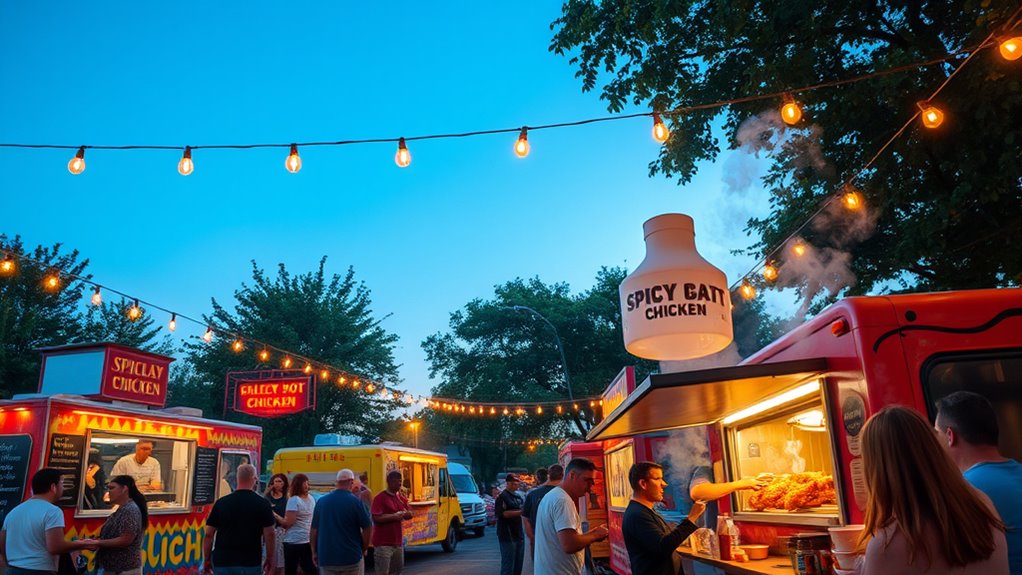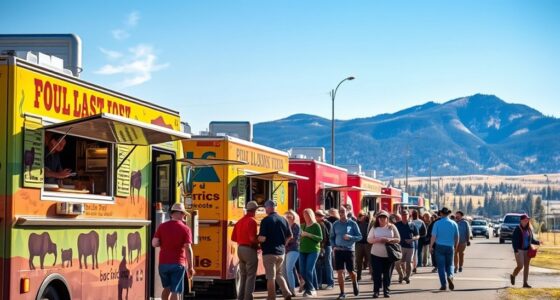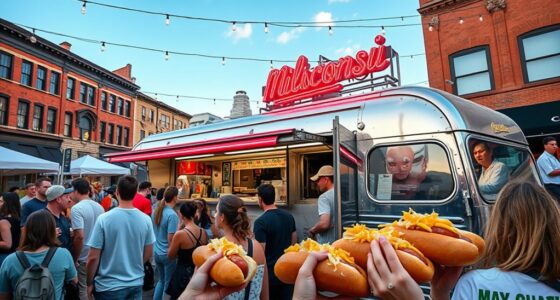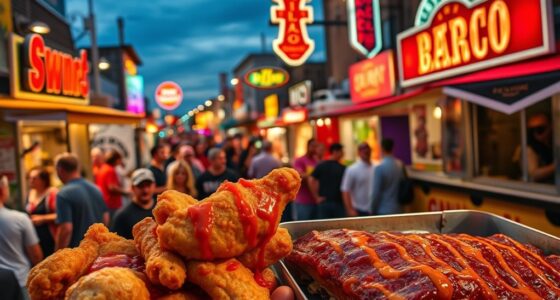Knoxville’s food truck scene is booming, especially for hot chicken and BBQ lovers. You can find Nashville-style hot chicken with spicy twists or enjoy smoked meats from local BBQ trucks around downtown and neighborhoods. Many trucks operate from certified spots with permits ensuring quality and safety. If you’re curious about where to sample the best dishes and learn about regulations behind the scenes, there’s plenty more to discover in Knoxville’s vibrant food truck culture.
Key Takeaways
- Knoxville’s food trucks offer a diverse range of hot chicken with flavors from mild to extra hot, blending Nashville traditions with local twists.
- Popular hot chicken trucks like Wicked Chicken, Hot Birds, and Prince’s Hot Chicken serve crispy, flavorful options in city-approved locations.
- Food trucks operating in Knoxville benefit from eased regulations, reduced permit fees, and designated zones, supporting local culinary innovation.
- BBQ trucks in Knoxville feature regional styles like Texas beef, West Tennessee pork, and Carolina influences, often served as catering options.
- Food trucks significantly contribute to Knoxville’s community, economy, and street culture, offering convenient access to hot chicken and BBQ.
The Rise of Knoxville’s Food Truck Scene
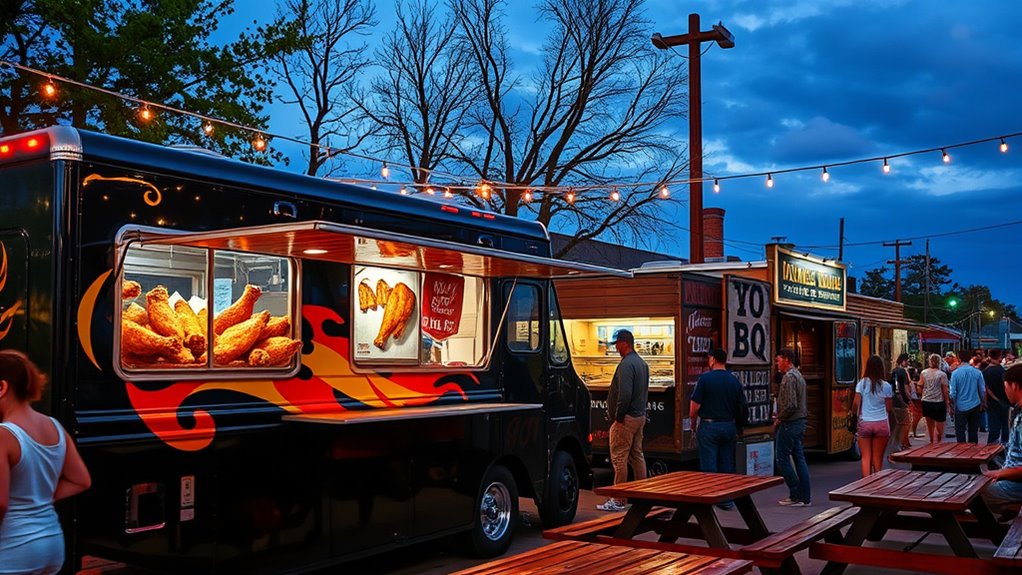
Knoxville’s food truck scene has experienced significant growth in recent years, driven by changing consumer preferences and supportive local policies. As more people seek diverse, quick, and convenient dining options, food trucks have become a popular alternative to traditional restaurants. Since 2014, city ordinances have made it easier for entrepreneurs to operate on public rights-of-way and private property, boosting the market. Reduced permit fees, starting at just $200 annually, lower entry barriers for new operators. Additionally, expanded operation zones allow trucks to reach more neighborhoods and events. This supportive environment encourages innovation and entrepreneurship, helping local food trucks thrive. The increase in regulatory support has been a key factor in fostering this growth. As a result, Knoxville’s culinary landscape is becoming more vibrant, with a growing variety of flavors and dining experiences available on the go. Supporting local businesses has further contributed to the positive growth of the scene.
Navigating Regulations and Permits for Food Trucks
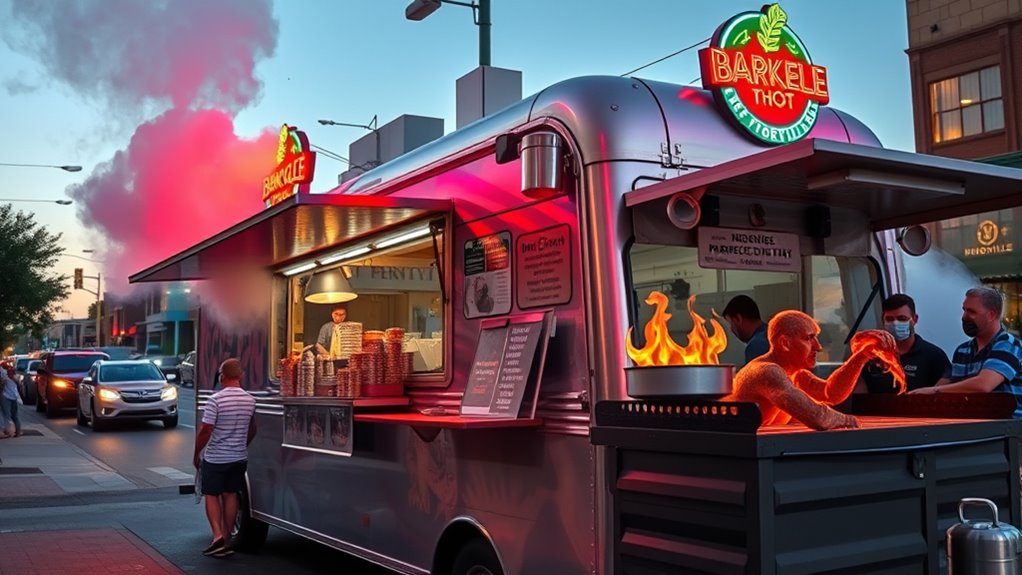
Are you unsure where to start when steering Knoxville’s food truck regulations? First, familiarize yourself with the Knoxville Food Truck Ordinance, which sets clear rules for operation zones, fees, and permits. You’ll need to apply for a permit, starting with health compliance through the Tennessee Department of Health, and submit documents like your business license, lease, and health inspections. Be aware of zoning restrictions—MFUs operate only in designated zones or private property with proper approval. Use the table below to see key requirements:
| Step | Requirement | Notes |
|---|---|---|
| 1 | Health & Business Licenses | Must comply with state regulations |
| 2 | Zoning & Location | Designated zones or approved private property |
| 3 | Site & Safety | Parking permits, fire access, electrical safety |
| 4 | Permits & Fees | $200 initial, $50 renewal, $75 event permits |
| 5 | Contacts | City Office & Health Department for support |
Stay compliant to keep your food truck running smoothly. Understanding local ordinances is essential to ensure your food truck operates within Knoxville’s regulations and avoids penalties.
Spotlight on Hot Chicken: Knoxville’s Spicy Favorite
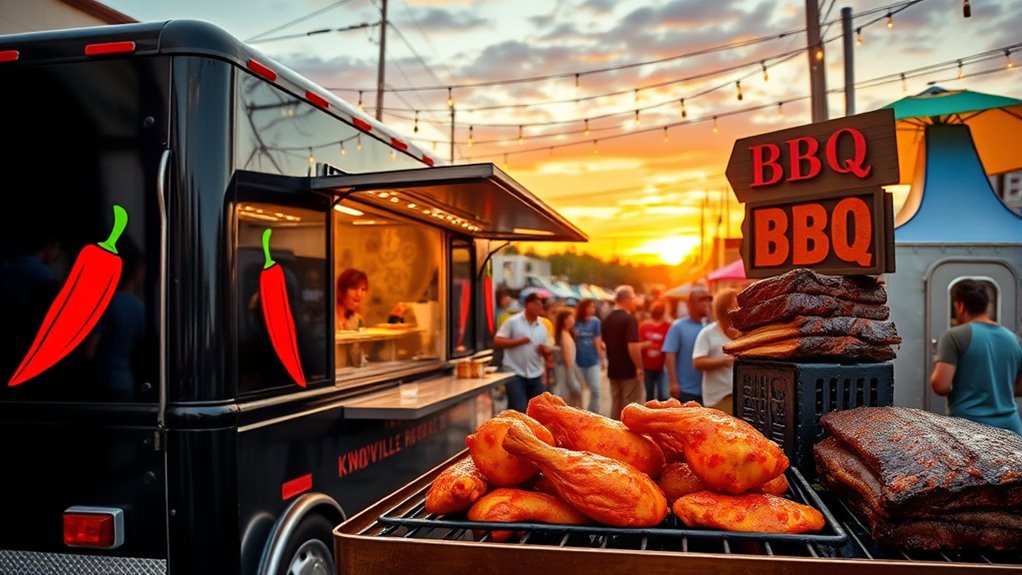
Knoxville’s hot chicken scene pays homage to Nashville’s spicy tradition while adding its own twists. You can find a variety of flavor levels, from mild to extra hot, in many popular food trucks around the city. These spots celebrate the dish’s rich history and bold flavors, making hot chicken a must-try for spice lovers. Hot chicken’s development as a regional specialty reflects its deep roots in Southern culinary culture and black communities. Additionally, the rise of food trucks has contributed to the accessibility and popularity of hot chicken across different neighborhoods.
Knoxville’s Hot Chicken Origins
Inspired by Nashville’s fiery hot chicken roots, Knoxville has embraced and adapted this spicy tradition into its own vibrant food scene. You’ll find local food trucks and eateries serving hot chicken with unique twists, rooted in Nashville’s original recipe from the 1930s. Thornton Prince’s accidental creation—soaked in cayenne and crispy fried—laid Nashville’s foundation, which Knoxville now celebrates. The dish’s community origins remain essential, reflecting Southern Black culture and resilience. Over time, hot chicken gained popularity beyond Nashville, especially with events like the Music City Hot Chicken Festival. Knoxville’s hot chicken scene continues to evolve, blending homage with innovation, making it a spicy staple in the city’s diverse food culture.
| Origin | Key Figure | Cultural Impact |
|---|---|---|
| Nashville, 1930s | Thornton Prince | Community pride |
| Black communities | Early popularity | Tradition & resilience |
| Mainstream adoption | Festivals & media | Citywide recognition |
Spicy Flavor Variations
Spicy flavor variations in Knoxville hot chicken showcase a vibrant range of heat levels and unique twists that cater to every palate. From mild to extra hot, vendors craft spice blends using cayenne, paprika, garlic, and brown sugar to balance heat and flavor. Some incorporate smoky elements or regional chili varieties, adding depth and complexity. The spice paste’s concentration is adjusted to control heat intensity, often combined with buttermilk marinades to tenderize and mellow the spice without sacrificing the kick. Knoxville’s hot chicken blends Nashville traditions with local influences, including global spices like Korean BBQ and smoky sauces, creating hybrid flavors. These flavor profiles demonstrate Knoxville’s innovative approach to spicy chicken, appealing to both purists and adventurous eaters alike. Whether served as tenders, sandwiches, or wings, these variations showcase Knoxville’s innovative approach to spicy chicken, appealing to both purists and adventurous eaters alike. Knoxville’s hot chicken is known for its unique fusion of flavors.
Popular Hot Chicken Spots
Among Knoxville’s hot chicken options, certain spots stand out for their dedication to flavor, authenticity, and quality. Wicked Chicken is known for adjustable spice levels and perfectly spiced sandwiches that keep locals coming back. Hot Birds offers Nashville-style hot chicken made from scratch, praised for crispiness and authentic flavor. Prince’s Hot Chicken, inside Yee Haw Brewery, emphasizes traditional regional flavors loved in Knoxville. Gus’s World Famous Fried Chicken provides bold-seasoned bone-in fried chicken, trusted for consistent quality. Myrtle’s Chicken & Beer combines Southern comfort with hot chicken, serving large portions and craft beer.
- Wicked Chicken’s customizable heat and friendly service
- Hot Birds’ fresh, crispy Nashville-style hot chicken
- Prince’s focus on tradition within a brewery setting
- Myrtle’s large portions paired with Southern sides
Tennessee BBQ on Wheels: Savoring Smoked Meats
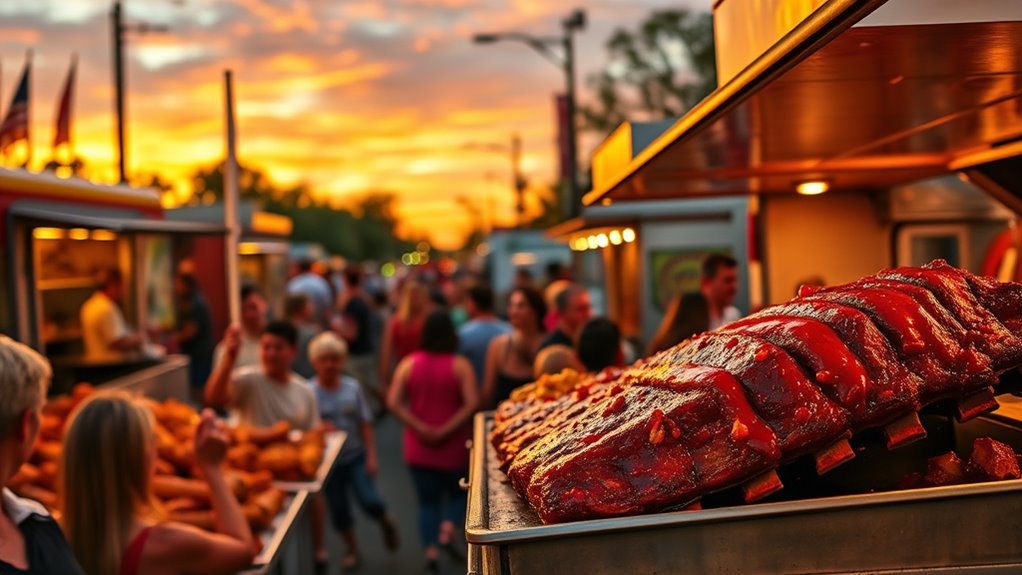
Tennessee BBQ on wheels offers a delicious journey through the state’s rich barbecue heritage, blending flavors and techniques from diverse regional styles. You’ll taste Texas-style beef, West Tennessee pork and chicken, and Carolina influences, all crafted with craft BBQ techniques. Slow-cooked over charcoal and hickory wood, the meats develop authentic smoky flavors. Expect menu staples like brisket, pulled pork, ribs, and smoked chicken, each prepared with regional rubs and sauces that emphasize sweetness, smokiness, and tang. Many trucks smoke meats for 6 to 12 hours, ensuring tender, flavorful results. These food trucks often serve not only as mobile eateries but also as catering options for events, offering customized menus. Their focus on tradition and regional influence makes every bite a true Southern barbecue experience. Additionally, some of these trucks incorporate best anime movies to attract diverse crowds, creating a unique fusion of culture and cuisine.
Where to Find Food Trucks in Knoxville’s Downtown and Districts
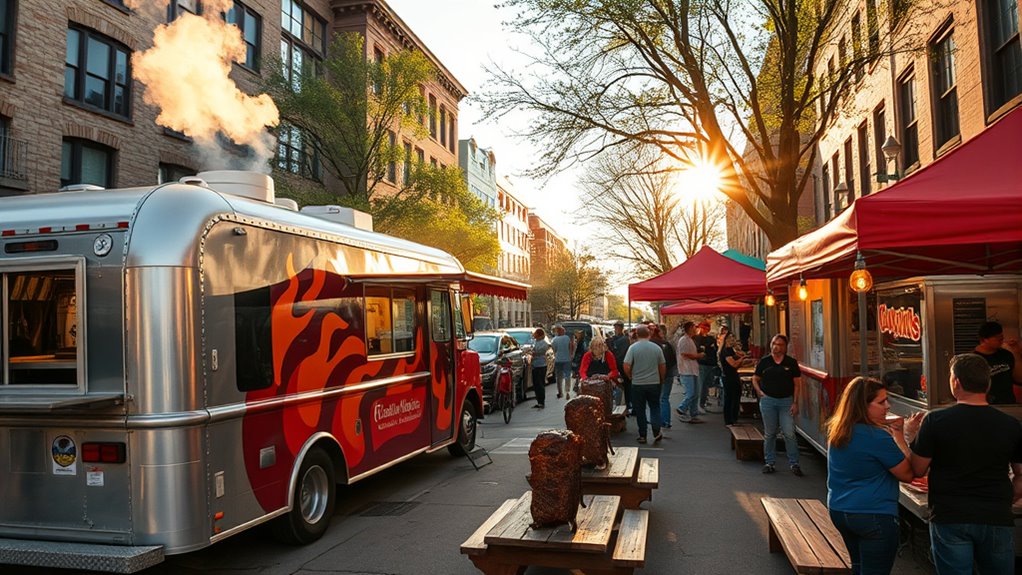
Knoxville’s downtown area and surrounding districts have become prime spots to find food trucks serving a variety of cuisines. Downtown features seven city-approved fixed sites, with Market Square and Gay Street as main hubs. Notable vendors like CJ’s Tacos at 507 South Gay Street draw crowds, especially during city events and festivals. Beyond downtown, districts near the University of Tennessee and North Knoxville expand access, with food truck parks like Central Filling Station serving multiple trucks. These districts often partner with breweries and outdoor venues to attract patrons. Neighborhood events rotate food truck lineups to foster community. The scene has grown steadily with new trucks each year, supporting a vibrant and diverse culinary landscape. Additionally, the city’s regulations and permits help ensure quality and safety for vendors and visitors alike.
- Strategic locations support diverse cuisines and community events
- City approval guarantees safety and legality
- Food truck parks create outdoor dining hubs
- Partnerships with breweries enhance the experience
Ensuring Food Safety and Quality in Mobile Kitchens
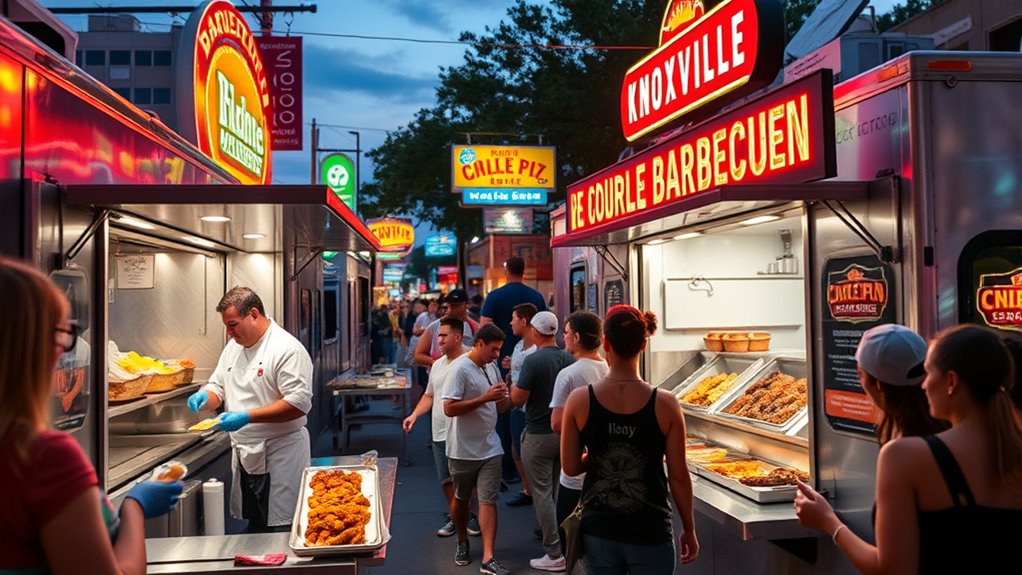
To keep your food truck’s offerings safe and top quality, you need to follow proper handling techniques and storage standards. Ensuring your equipment meets inspection protocols is essential for compliance and customer trust. When you prioritize these practices, you protect your customers and your business’s reputation. Additionally, the new state fire permit law simplifies the process of maintaining compliance and ensures that your food truck adheres to heightened fire safety standards. Implementing proper display techniques can also help in maintaining the quality and safety of ingredients during service.
Proper Food Handling Techniques
Maintaining proper food handling techniques is essential for guaranteeing safety and quality in mobile kitchens. You must keep hot foods at or above 135°F and cold foods at or below 41°F to prevent bacteria growth. Use calibrated thermometers to check temperatures regularly and avoid the danger zone between 41°F and 135°F. Practice good personal hygiene by washing hands frequently, changing gloves between tasks, and keeping sick or injured staff away. Prevent cross-contamination by separating raw and cooked foods and sanitizing utensils and surfaces often. Follow strict cleaning routines and use approved sanitizers to maintain hygienic conditions. Keep detailed records of food sourcing, inspections, and temperature logs to ensure compliance and food safety. Proper handling safeguards your customers’ health and maintains the quality of your offerings. Being aware of raw food safety guidelines can help prevent contamination and ensure the best possible service.
Equipment and Storage Standards
Ensuring food safety and quality in mobile kitchens relies heavily on meeting equipment and storage standards approved by local health authorities. You must use commercial-grade, durable equipment that withstands heavy use, ensuring efficiency and consistent food quality. All equipment needs to comply with local building, electrical, plumbing, and fire safety codes, including having fire extinguishers on board. Proper refrigeration and freezer units are essential to keep raw and cooked foods at safe temperatures, preventing spoilage. Storage areas should be approved, pest-controlled, and designed to prevent cross-contamination, with all food and single-service items stored at a permitted commissary when not in use. Additionally, onboard storage accessories must be NSF-listed or equivalent, and surfaces inside the truck must be smooth, easy to clean, and durable for sanitation. Meeting these standards is vital to prevent health violations and ensure customer safety. Maintaining proper storage conditions also helps preserve food quality and minimizes waste, supporting operational efficiency.
Compliance With Inspection Protocols
Compliance with inspection protocols is a crucial part of keeping your mobile kitchen safe and operational. It guarantees you meet local health, fire, and safety standards, preventing violations that could shut you down. Regular inspections by the Fire Marshal’s Office, Electric Inspector, and Health Department verify your equipment, water systems, and waste management practices. You must display valid permits and submit thorough documentation, including floor plans and licenses, to maintain approval. Temporary permits allow event-based operations but require prior approval. Fire safety equipment, like extinguishers and suppression systems, must be certified and functional. Additionally, electrical wiring and wastewater handling are inspected routinely. Staying compliant not only protects your customers but also preserves your reputation and ensures your mobile kitchen runs smoothly. Being aware of local regulations helps you avoid penalties and stay open.
- Regular inspections verify ongoing safety standards
- Proper documentation keeps your permit active
- Fire and electrical safety equipment must be certified
- Wastewater and water systems require strict adherence
Impact of Food Trucks on Local Communities and Economy
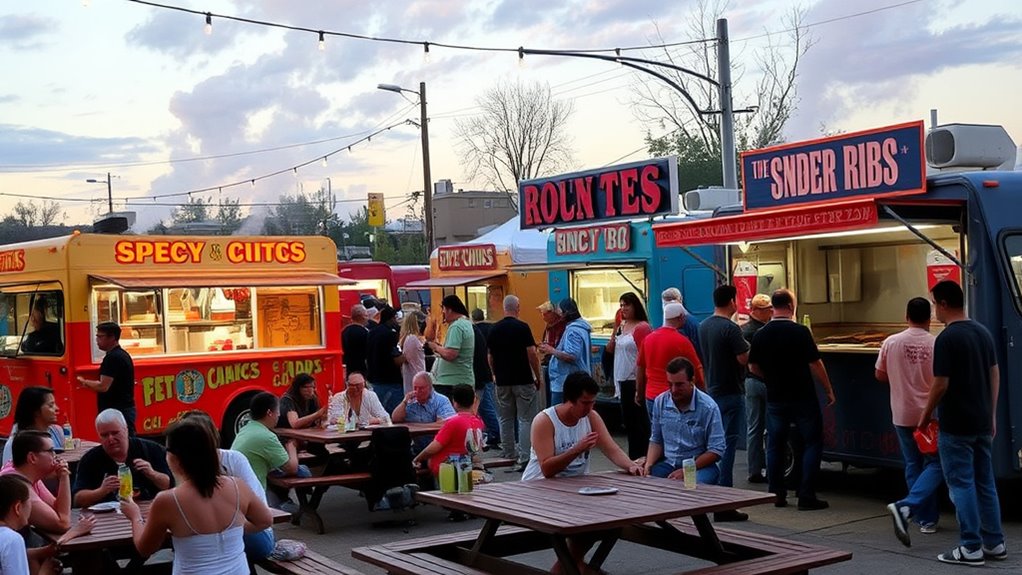
Have you noticed how food trucks have become a vibrant part of Knoxville’s street life and local economy? They create jobs, with average wages around $15.96 per hour, and some earn up to $22.48. The city’s support through reduced permit fees and pilot programs since 2014 helps sustain this growth. Food trucks contribute to a $3.1 billion industry nationally, boosting local revenue and providing opportunities for micro-businesses. They support diverse employment, including part-time, seasonal, and gig roles, while also fostering community engagement. By collaborating with local farmers and serving underserved neighborhoods, food trucks promote food equity and cultural diversity. Their flexibility at events and markets energizes Knoxville’s social scene, making them key contributors to the city’s economic and cultural vitality. Revenue figures from 2025 show that food trucks in Tennessee can earn a median revenue that reflects the thriving market in the region. Additionally, their integration into sustainable practices aligns with consumer preferences for eco-friendly options.
Frequently Asked Questions
How Do Food Trucks Get Approved to Operate in Knoxville?
To get approved to operate your food truck in Knoxville, you need to obtain a Mobile Food Unit permit and a Health Department license, both of which must be prominently displayed. You’ll also need a business license, submit required documentation like floor plans, and follow location and safety restrictions. Make sure to operate within designated zones and comply with all health, safety, and environmental regulations to guarantee your approval process goes smoothly.
Are There Specific Health Inspections Required for Hot Chicken Trucks?
You’ve heard “trust, but verify,” and that’s true for hot chicken trucks in Knoxville. You’ll need to pass health inspections that check fire safety equipment, proper food handling, and sanitation standards. The truck must display a valid Health Department License, and inspections happen regularly. Fire extinguishers, hood suppression systems, and proper documentation are all part of ensuring your truck’s compliance. Stay on top of these, and your hot chicken will serve safely and deliciously.
Can I Book a Hot Chicken or BBQ Truck for Private Events?
Yes, you can book a hot chicken or BBQ truck for your private event. You’ll need to contact the truck directly, either online or by phone, to discuss your date, menu preferences, and event details. Be sure to secure in advance, especially during peak seasons, and clarify any requirements like permits or special dietary needs. Confirm pricing, cancellations, and logistics to guarantee a smooth, flavorful experience for your guests.
What Are the Best Times to Find Food Trucks Downtown?
You’ll find food trucks downtown mostly during weekday lunch hours from 11 AM to 2 PM, when office workers and students grab a quick bite. During weekends, look for trucks in the afternoon and evening at food truck parks or events. Keep in mind, some trucks also operate during special events or festivals, extending their hours. To catch your favorites, plan around these peak times and check local schedules.
How Do Food Trucks Impact Knoxville’s Local Restaurant Industry?
You might think food trucks hurt local restaurants, but ironically, they actually boost the scene. By offering quick, affordable options, they attract more diners overall, increasing food spending in Knoxville. Their mobility brings foot traffic to different neighborhoods, often helping nearby restaurants too. Plus, their lower overhead costs and unique menus add culinary diversity, making Knoxville a more vibrant food destination—benefiting everyone, not just the trucks.
Conclusion
As you explore Knoxville’s vibrant food truck scene, you’re experiencing a modern twist on a timeless tradition. From fiery hot chicken to smoky BBQ, these mobile kitchens bring flavor and community togetherness, much like a lively street fair. Embrace the excitement, knowing each bite supports local entrepreneurs. Just like a beloved jukebox in a corner diner, these trucks keep Knoxville’s food culture alive and kicking—deliciously and authentically.
